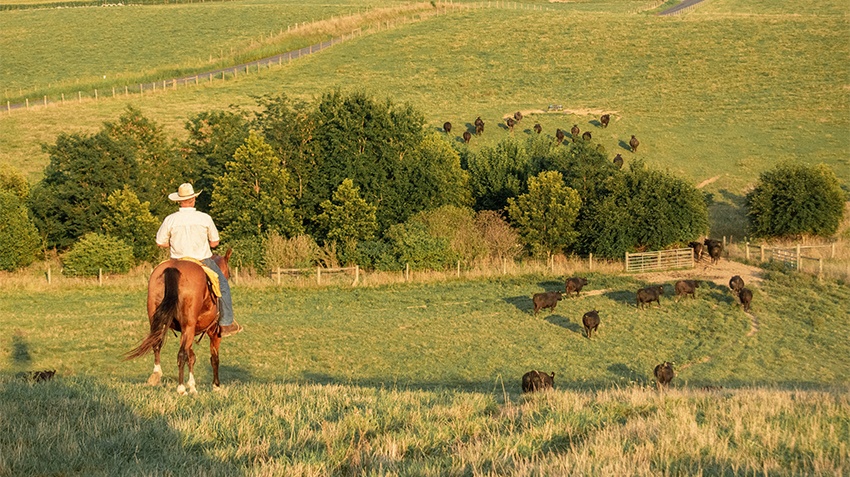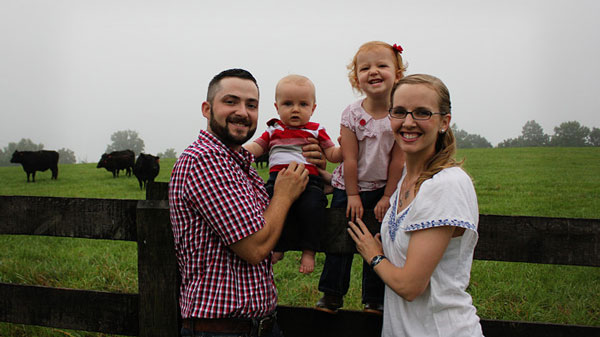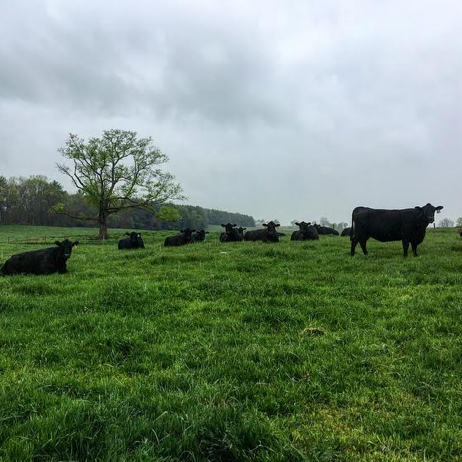Ronnie Russell - Corbin Hall Farm
[MacKenzie Moore]
As I pulled down the long entry way of Corbin Hall Farm in Middlesex County, Virginia I couldn't help but stop a few times on the way to the barn off to take in the view of the large row crop fields, cattle, and water ways. This operation having about 2000 acres of high productive agriculture acres, is truly a sight to see! When I reached the barn to meet Ronnie Russel the operations manager, I could see the happiness in his smile that he greeted me with letting me know he is ready for another successful season of farming.
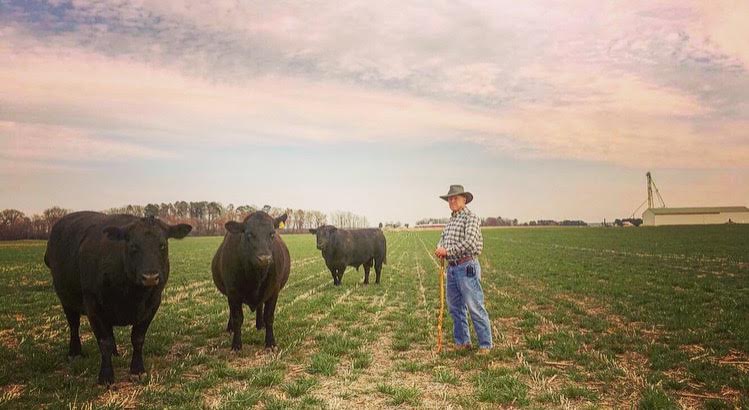
[Introduction]
Corbin Hall Farm, located in eastern Virgina in Middlesex County, was owned by the Harold family for 56 years. Mr. Harold purchased the farm in 1959 when it consisted of about 500 acres of open farm ground. Corbin Hall recently changed hands. After the passing of her husband, Mrs. Harrell sold the farm to Walt Hurley, a native of Urbana, Virginia. Hurley wants to keep beef cattle as an aspect of the operation.
Ronnie Russell, the current Farm Operations Manager, at age thirteen, along with his family, moved from Norfolk to Middlesex and brought about twenty head of commercial beef cattle with them. His family began managing the farm and clearing more land. Today, the land has been cleared to around 2,000 acres of highly productive farm and pasture land. As more land was cleared, they started to increase the number of head within the herd. The amount of open land allows for the cows to be ranged, and therefore less money is spent on cattle feed. Since Corbin Hall is mostly a grain crop farm, the cattle are let out on the cover-crop fields to graze throughout the winter months. Located on the middle peninsula, Corbin Hall is an integral part of the fenced-out program that keeps the cattle out of streams and waterways to help the environment.
VBC: Sustainability is important to everyone, but it can be defined in a variety of ways. What does sustainability mean to you, and what does it look like on your farm?
Ronnie: For us, sustainability really fits in to how unique our operation is, especially with the feeding aspect. Our inputs for the cattle are so little it will allow us to keep cattle here on the farm. We know we can also feed more cows than the fifty or so that we already do and still be successful. The most unique thing about Corbin Hall is the amount of feed we use. It is very small-scale compared to most beef producers. In this part of the state, we rarely have temperatures that are very cold or bad weather, so even through the winter, we don't have to feed much hay to our cattle since we have so much land. With our owner change, we are hoping to bring more cattle to the operation. Personally, to be more successful with beef production I believe that the operation needs to grow and be larger than the herd that we have currently. I also believe that finding a niche market would help us to be successful as well.
VBC: How is technology used on your operation?
Ronnie: For the most part, we are a high tech operation. The technology that we do have is mainly on the crops side of our production: We have GPS on our tractors, planters, and sprayers. To a certain extent, this technology does help with the cattle production because it allows for less waste and less overlap with what we do as far as chemical and fertilizers.
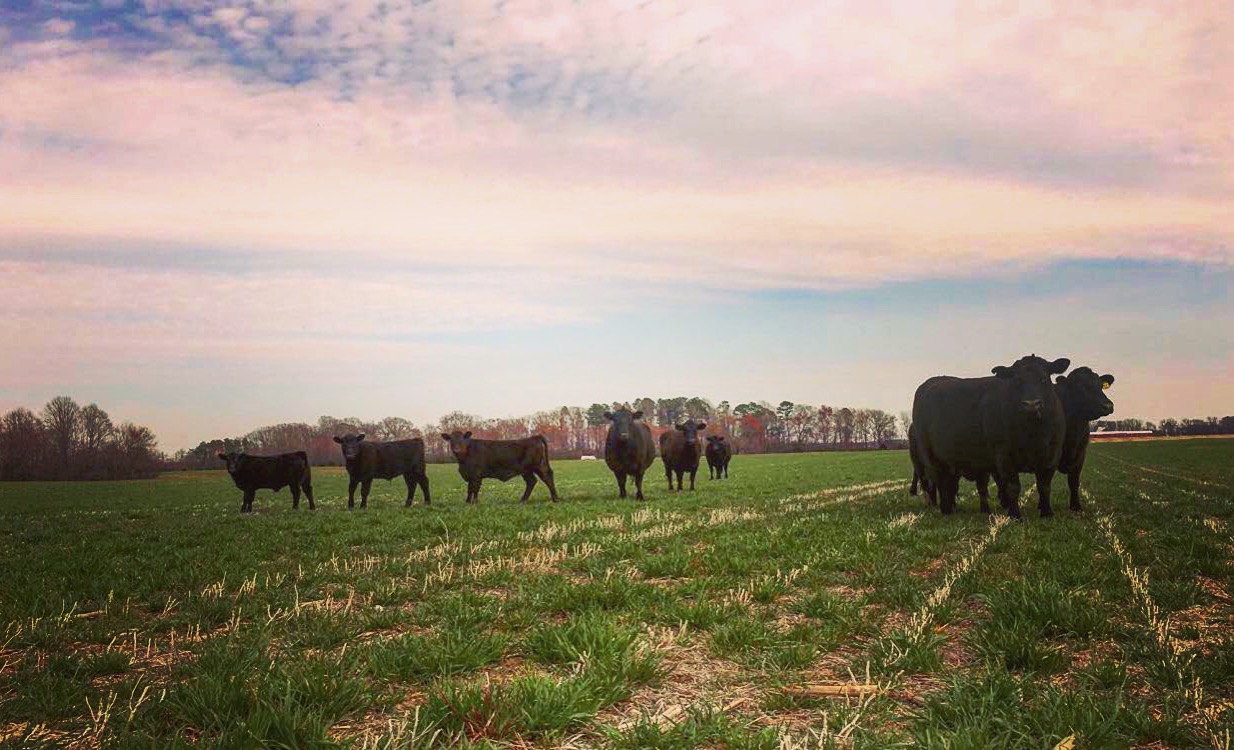
Corbin Hall Cattle
A bull (front) leads the herd in examining our photographer while out on open pasture. The cattle here are commercial cattle, which means they are likely mixed or hybrid breeds that will enter the food system.
VBC: How do you participate and play a role in producing high-quality beef that is safe for consumers?
Ronnie: Even though you would call us part time beef producers, we still look for good genetics in the bulls that we purchase to breed our cows. We sell our cows and calves to local people with also reduces the likeness of some disease and health issues in the cattle. I don't think we could raise any healthier cattle than we currently do on this open range. Our pastures are always in great shape, we keep parasites out of our cattle, and only treat cattle when they are sick and need it.
VBC: That sounds ideal. So how do you personally prefer to eat beef?
Ronnie: I would say the Ribeye is my favorite cut of beef, and I think it's best grilled with light seasoning.
VBC: Sounds delicious! It seems like you really enjoy your job. What are some of the greatest opportunities you have had through being part of the beef industry?
Ronnie: I really enjoy working with the cows and seeing the small part that I contribute to the overall beef industry. I am also looking forward to the opportunity to increase our herd in the future.
VBC: If you could describe the life of a beef producer in one word, what would that word be and why?
Ronnie: Great. It's farming, being part of the land, and knowing you are making a difference in the lives of so many people. It is the opportunities you have with being a small part of a large industry.
